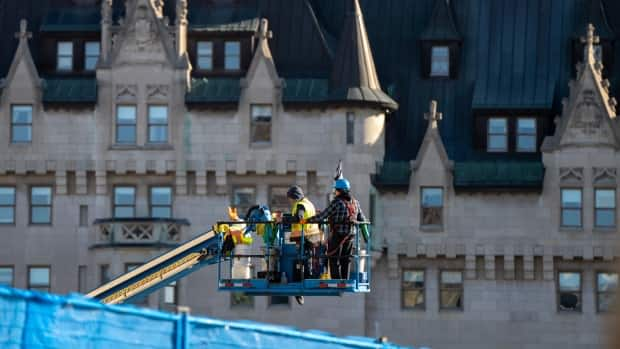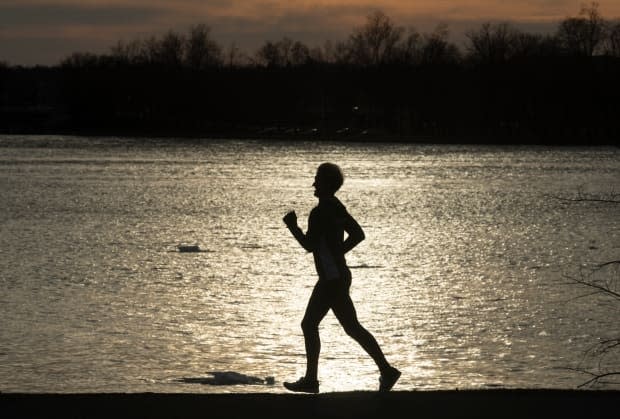What you need to know about COVID-19 in Ottawa on Saturday, April 10

Recent developments:
Schools could close after spring break, Dr. Vera Etches says.
What's the latest?
Ottawa is reporting 325 new cases of COVID-19 on Saturday, the second day in a row the city has logged record-high numbers.
With spring break upon us, Ottawa's health experts and politicians are advising residents to abide by the province's stay-at-home order and not travel.
And it's "more likely than not" that schools will remain closed after the end of next week's spring break, Ottawa's medical officer of health said Friday.
While COVID-19 has spread to every corner of Ottawa, vaccination rates vary substantially from neighbourhood to neighbourhood, according to data compiled by the Institute for Clinical Evaluative Sciences. Search for your neighbourhood's rate here.
Are you allowed to go for a walk with a friend? How about a backyard barbecue? Here are some answers to some questions you might have.
How many cases are there?
The region is in a record-breaking third wave of the pandemic, which includes more dangerous coronavirus variants.
As of Saturday, 19,355 Ottawa residents have tested positive for COVID-19. There are 2,200 known active cases, 16,680 resolved cases and 475 deaths.
Public health officials have reported more than 35,500 COVID-19 cases across eastern Ontario and western Quebec, including more than 30,800 resolved cases.
Elsewhere in eastern Ontario, 152 people have died. In western Quebec, the death toll is 178.
Akwesasne has had more than 280 residents test positive on the Canadian side of the border and seven deaths. It's had more than 570 cases when its southern section is added.
Kitigan Zibi is currently under a stay-at-home order because of a spike of about 15 cases, according to its chief. It had about 20 confirmed cases before this.
Tyendinaga Mohawk Territory has had 11, with one death.
CBC Ottawa is profiling those who've died of COVID-19. If you'd like to share your loved one's story, please get in touch.
What can I do?
Eastern Ontario:
Ontario is under a stay-at-home order until at least the first week of May.
People can only leave home for essential reasons such as getting groceries or health care and exercising. They're asked to only leave their immediate area or province if it's absolutely necessary.
Ottawa Mayor Jim Watson said Thursday bylaw officers will inspect stores and respond to complaints in homes and parks
Indoor gatherings are not allowed, except for people who live together and those who live alone to see one other household. Outdoor gatherings have to be essential, masked and distanced.
Most non-essential businesses can only offer curbside pickup. Access to malls is restricted and big-box stores can only sell essential items.
Schools are not being forced to close.
Gyms and personal care services must close, while restaurants are only available for takeout and delivery.
Local health units can also set their own rules, like what Prince Edward County's is doing around travel.
Ottawa's medical officer of health is one of the officials that asked the province for stronger rules, including paid sick leave, travel restrictions within Ontario and more online learning in places where school outbreaks are a problem.
Western Quebec
Premier François Legault said the situation is critical in Gatineau and is asking people there to only leave home when it's essential.
Schools, gyms, theatres, personal care services and non-essential businesses are closed until April 19 in Gatineau and in the MRC des Collines-de-l'Outaouais, which almost entirely surrounds the city.
Private gatherings are banned, except for a person who lives alone seeing one other household.
Distanced outdoor exercise is allowed in groups up to eight people. Places of worship can have a maximum of 25 people.
The curfew there now starts at 8 p.m.

The rest of the Outaouais is under red-zone rules, which closes restaurant dining rooms and gyms, but keeps schools, theatres, personal care services and non-essential businesses open with restrictions.
The start of the curfew in this area remains at 9:30 p.m.
People in the Outaouais are asked to only have close contact with people they live with, be masked and distanced for all other in-person contact and only leave their immediate area for essential reasons — under threat of a fine if they go to a yellow or green zone.
WATCH | OPH will likely close schools after spring break:
Distancing and isolating
The novel coronavirus primarily spreads through droplets when an infected person speaks, coughs, sneezes, or breathes onto someone or something. These droplets can hang in the air.
People can be contagious without symptoms, even after getting a vaccine. New coronavirus variants can be more contagious and are spreading quickly.
This means it is important to take precautions now and in the future like staying home while sick — and getting help with costs if needed — keeping hands and surfaces clean and maintaining distance from anyone you don't live with, even with a mask on.
Masks, preferably ones that fit snugly and have three layers, are mandatory in indoor public settings in Ontario and Quebec.
OPH says residents should wear masks outside their homes whenever possible.

Health Canada recommends older adults and people with underlying medical conditions and/or weakened immune systems stay home as much as possible and get help with errands.
People have to show proof of a recent negative COVID-19 test to enter Canada by land without a fine and have to pay for their stay in a quarantine hotel if entering by air.
Anyone with COVID-19 symptoms should self-isolate, as should those who've been ordered to do so by their public health unit. The length varies in Quebec and Ontario.
Vaccines
Four COVID-19 vaccines have been approved in Canada.
Canada's task force said first doses offer such strong protection that people can wait up to four months to get a second.
More than 415,000 doses have been given out in the Ottawa-Gatineau region since mid-December, including about 182,000 doses to Ottawa residents and about 71,000 in western Quebec.
Eastern Ontario
Ontario's first doses of Phase 1 generally went to care home residents and health-care workers. It is now in Phase 2.
All health units in eastern Ontario except Renfrew County are now vaccinating people age 60 and older. People can book appointments online or over the phone.
Phase 2 includes people with underlying health conditions starting this month, followed by essential workers who can't work from home in May.
Phase 3, slated to begin in July, will involve vaccinating anyone older than 16.
Local health units have some flexibility in the larger framework, so check their websites for details.
Some Ottawans in certain priority neighbourhoods can check their eligibility online and call the city at 613-691-5505 for an appointment.
Separately, the province has opened up appointments for people age 50 to 54 in K1T, K1V and K2V "hot spot" postal codes, though supply is currently limited. This should soon include all education workers and staff in large workplaces.
Indigenous people over age 16 in Ottawa can make an appointment the same way.
People who are above or turning age 55 can contact participating pharmacies for a vaccine appointment as part of a pilot project.
Western Quebec
Quebec also started by vaccinating people in care homes and health-care workers.
The vaccination plan now covers people age 60 and older at western Quebec clinics. People age 55 to 79 can line up in their vehicles to get a ticket for a walk-up appointment at Gatineau's Palais des Congrès.
That will be followed by local essential workers and people with chronic illness, and finally the general public.
Officials expect everyone who wants a shot to be able to get one by by Fête nationale on June 24.
People who qualify can make an appointment online or over the phone. Pharmacists there will also be giving shots.
Symptoms and testing
COVID-19 can range from a cold-like illness to a severe lung infection, with common symptoms including fever, a cough, vomiting and loss of taste or smell. Children tend to have an upset stomach and/or a rash.
If you have severe symptoms, call 911.
Mental health can also be affected by the pandemic, and resources are available to help.
In eastern Ontario:
Anyone seeking a test should book an appointment.
Ontario recommends only getting tested if you have symptoms, if you've been told to by your health unit or the province, or if you fit certain other criteria.
People without symptoms but who are part of the province's targeted testing strategy can make an appointment at select pharmacies.
Travellers who need a test have very few local options to pay for one.
Check with your area's health unit for clinic locations and hours. Some are offering pop-up or mobile clinics.
In western Quebec:
Tests are strongly recommended for people with symptoms and their contacts.
Outaouais residents can make an appointment in Gatineau at 135 blvd. Saint-Raymond or 617 ave. Buckingham. They can check the wait time for the Saint-Raymond site.
There are recurring clinics by appointment in communities such as Maniwaki and Petite-Nation.
Call 1-877-644-4545 with questions, including if walk-in testing is available nearby.
First Nations, Inuit and Métis:
Akwesasne has a COVID-19 test site by appointment only and a curfew of 11 p.m. to 5 a.m. It's closed to non-essential visits until Sunday.
Anyone returning to the community on the Canadian side of the international border who's been farther than 160 kilometres away — or visited Montreal — for non-essential reasons is asked to self-isolate for 14 days.
People in Pikwakanagan can book a COVID-19 test by calling 613-625-1175. Anyone in Tyendinaga who's interested in a test can call 613-967-3603 and in Kitigan Zibi, 819-449-5593.
Inuit in Ottawa can call the Akausivik Inuit Family Health Team at 613-740-0999 for service, including testing and vaccines, in Inuktitut or English on weekdays.
For more information

